Bakima Ssebanakitta
Bakima Ssebanakitta graduated Magna Cum Laude in Spring 2023 with a BA in Psychology through the Honors Program. Ssebanakitta has seven years of experience in professional life coaching, mediation, and end-of-life facilitation applications. Pursuing a path towards a PhD in Psychology, Ssebanakitta plans to expand into tenured professorship and private counseling practice. In counseling, her aim is to educate clients on self-advocacy and somatic approaches to healing. She hopes her research and creative writing background will merge valid academic knowledge into the public sphere, by culminating in an actionable book for humanity.
Ssebanakitta focused her undergraduate research in the quantitative relationships between stress and resiliency under the mentorship of Dr. Jillene Seiver. Future research interests include the cause of motivation, grief navigation, equitable societal applications of resilience, and grief scale creation.
Ssebanakitta was accepted by Gonzaga University’s MA in Clinical Mental Health Counseling program, and Seattle Pacific University’s Clinical Psychology PhD program, with funding. She will attend Eastern Washington University’s Master of Science in Counseling: Clinical Mental Health Specialization program as a Ballmer Behavioral Health Scholar, and serve as the new McNair GSA!
2022 EWU Faculty Research Mentor: Dr. Jillene Seiver
Research Poster
Research Title: Growth in Adults through the Covid-19 Pandemic
Abstract: Studies have shown that 60% of the US population will experience at least one potentially traumatic stressor within their lifetime (Yehuda, 2004). Kessler et al. (2005) suggest that approximately 3.5% of the population will show clinical levels of PTSD. As trauma begets future trauma (Gould et al., 2021), and past suffering negatively correlates with life satisfaction (Shrira & Shmotkin, 2008), understanding the properties of trauma resilience benefits the overall welfare of our human community at large. Yehuda (2004) indicated that six out of every ten people navigate the nine months directly following a traumatic stressor with both Post Traumatic Stress Disorder (PTSD; Gould et al., 2021; Yehuda, 2004) and Post Traumatic Growth (PTG; Kou et al., 2021). While we can attempt to influence non-harming behaviors and events for the population, direct control lies in individual skill development to navigate the distressing changes of life with more ease.
Thomas et al. (2020) described emotional intelligence’s (EI) effect as a mediator upon cognitive emotional regulation (CER) and Posttraumatic growth (PTG). Post Traumatic Growth is generally defined as a blanket term for the desirable, mental change directly developed by the difficulty of navigating extreme life events (Kou et al., 2021). Thomas et al. (2020) found positive and significant correlations of all adaptive CER strategies to both EI and PTG. Additionally, EI acted directly as a mediator upon CER Acceptance and positive reappraisal, and indirectly upon CER positive refocusing and refocusing on planning. Such resiliency increases can be used as a measure of overall Mental Wellness and the likelihood of remission from PTSD (Connor, 2006).
The current study utilized an additive cognitive approach to emotions and life satisfaction regarding trauma risk, experience, and outcomes, and questioned how past trauma and personal traits affect college students’ response to pandemic stressors. This study expands from Thomas et al.’s design, to discover whether those findings were repeatable, and added an analysis of frequency of past potentially traumatic event experiences (High Magnitude Stressor; HMS), EI factors vs. total EI score, and grief as an isolated stress factor. Conducted after the “height” of the COVID-19 pandemic, the current study combines the trauma event sources from Thomas et al. (2020) through a 2+ year, and an ongoing unique opportunity to widely study a protracted stressor (Covid-19 Pandemic) with varying levels of isolated yet related HMS events. We hypothesized that Thomas et al. (2020)’s findings would be generally supported; that grief would correlate with EI and PTG in parallel patterns to trauma history; and HMS would positively correlate with PTG, CER, and EI factors.
182 adult participants of a mostly student population (91%) were recruited from Eastern Washington University summer and fall quarter psychology classes. The sample was majority Female (88.4%), with ages ranging from 18-53 years old (M=24.71, SD= 8.20), and primarily White/Caucasian (56.8%), followed by Other (15.3%), Hispanic/Latino (11.5%), Asian/Pacific Islander (9.8%), Black (6%), and American Indian/Alaskan Native respondents (0.5%). All participants noted at least one HMS event in their lifetime (range = 1-24). 21.4% noted at least one Traumatic Stressor (TS), 19.8% noted at least one Persisting Posttraumatic Distress symptom event. Covid-19 was considered as an additional traumatic event for all participants without adjusting HMS count. Via SurveyMonkey, all participants completed four scales assessing trauma history (THS), cognitive-emotional regulation (CERQ), emotional intelligence (AES/SREIS), post-traumatic growth (PTGI), and several items regarding COVID-19’s impact.
The scores on the CERQ subscales, the AES/SREIS scores, and the HMS scores were divided into quartiles, and the bottom 25% of scores were labeled “low,” the top 25% were labeled “high,” and the middle 50% were labeled “middle.” A 3 (CERQ Acceptance) X 3 (CERQ Positive Reappraisal) X 3 (CERQ Perspective) MANOVA was performed on the PTGI and its five subscales (PTGI Relating, PTGI New Possibilities, PTGI Personal Strength, PTGI Spiritual Change, PTGI Life Appreciation, PTGI Total) with AES/SREIS as a covariate was run. These three adaptive CERQ traits were found to have significant effects upon PTGI Spiritual Change, PTGI Relating, PTGI New Possibilities, and PTGI Total with CERQ Positive Reappraisal having effecting the most variables (all four). For each CERQ Trait, significance of effect increased as the CERQ trait score strengthened. A subsequent MANOVA with HMS categories as the IV, AES/SREIS as a covariate, and the COVID effects questions as the DVs was calculated. A main effect of HMS was found for responses to the effect of COVID shutdown on life, with higher HMS scores correlating to higher effect sizes.
These results support EI’s importance with what positive psychology calls “the good life” through times of distress as well as when encountering daily average life events. Utilization of cognitive and behavioral coping skills to assist the internal narrative navigation post-event is crucial to outcome potentials. Additionally, support for the exploration of separate grief items on distress and anxiety related measures will be presented.
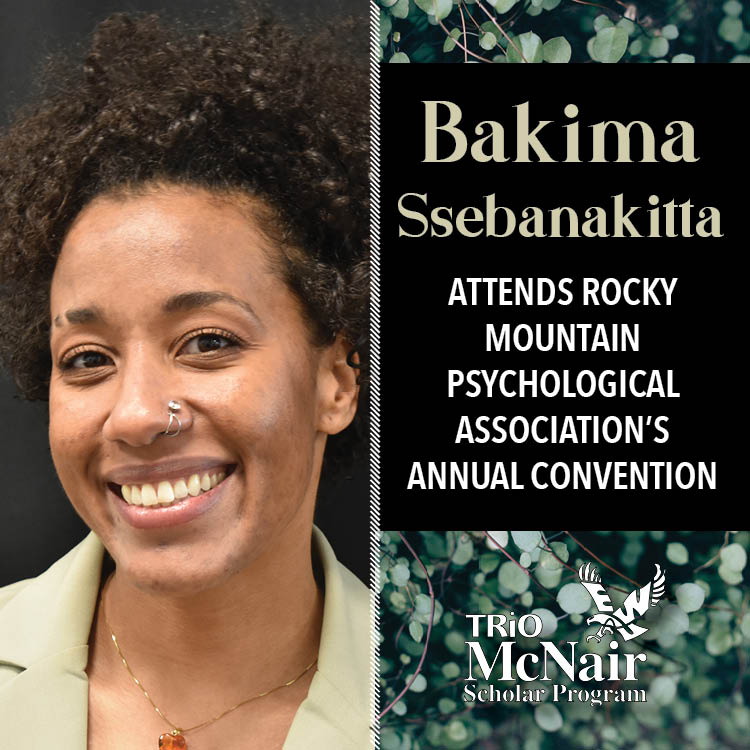
EWU McNair Scholar Bakima Ssebanakitta Attends Rocky Mountain Psychological Association’s Conference
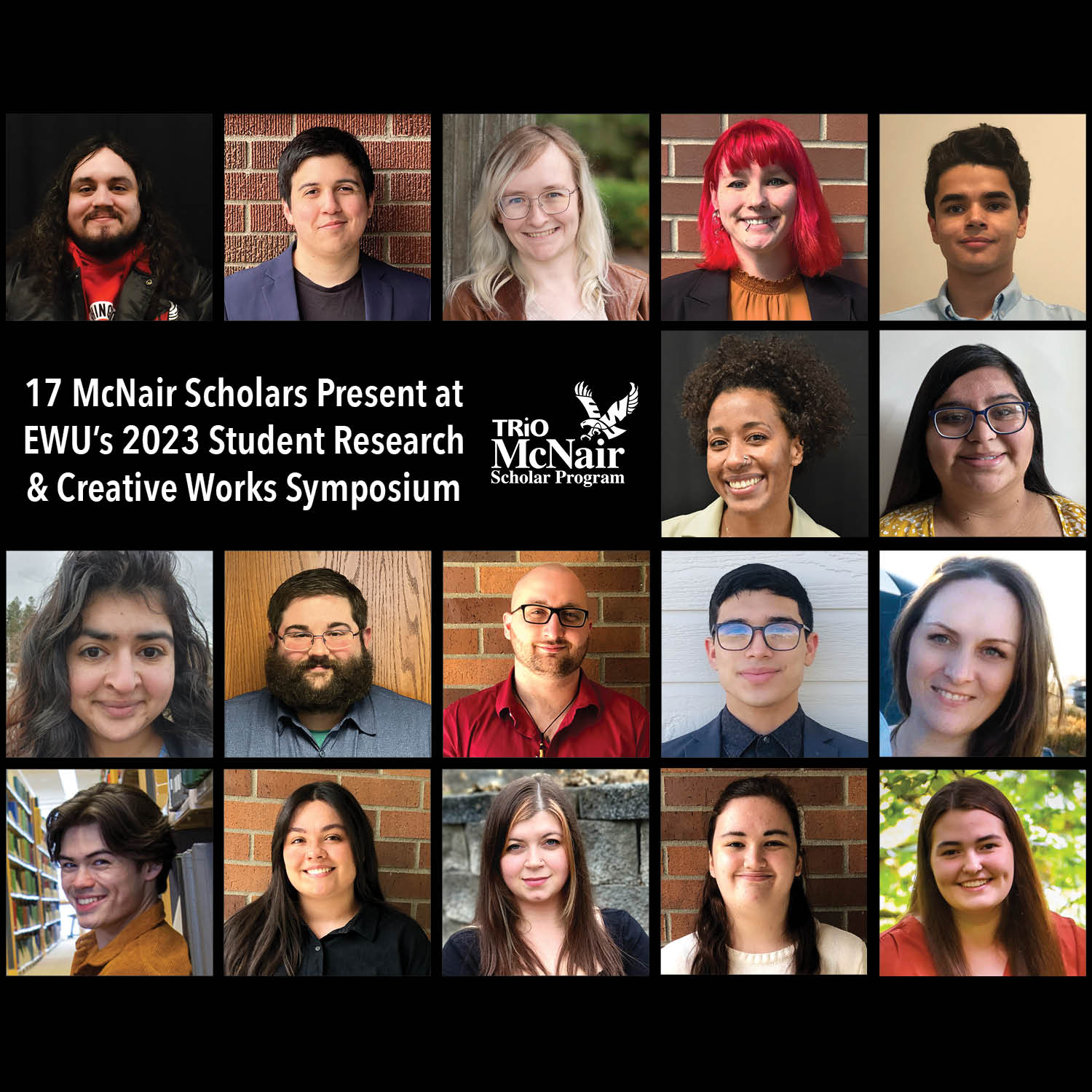
17 McNair Scholars Present at EWU’s 2023 Student Research & Creative Works Symposium
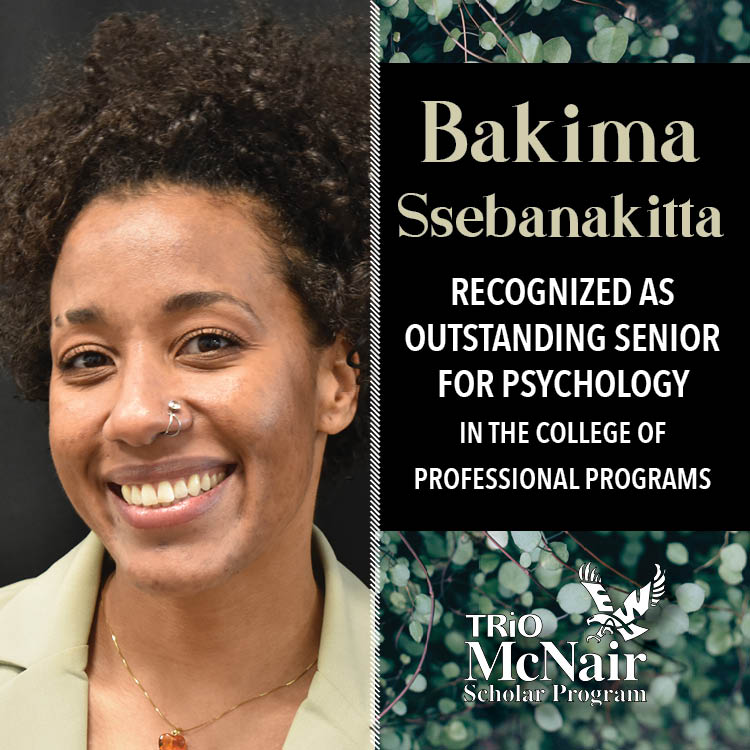
EWU McNair Scholar Bakima Ssebanakitta recognized as Outstanding Senior
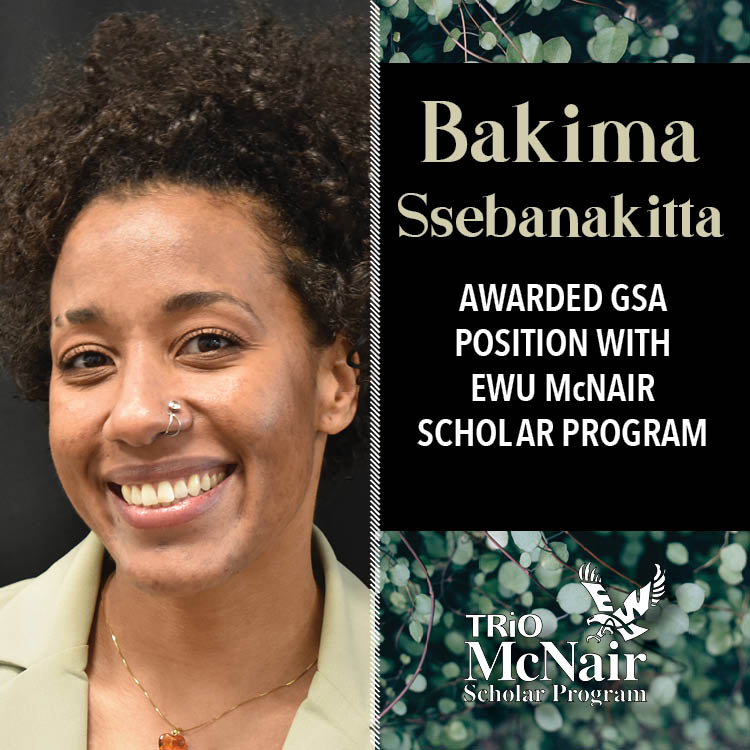
EWU McNair Scholar Bakima Ssebanakitta Selected as GSA for EWU McNair Scholar Program
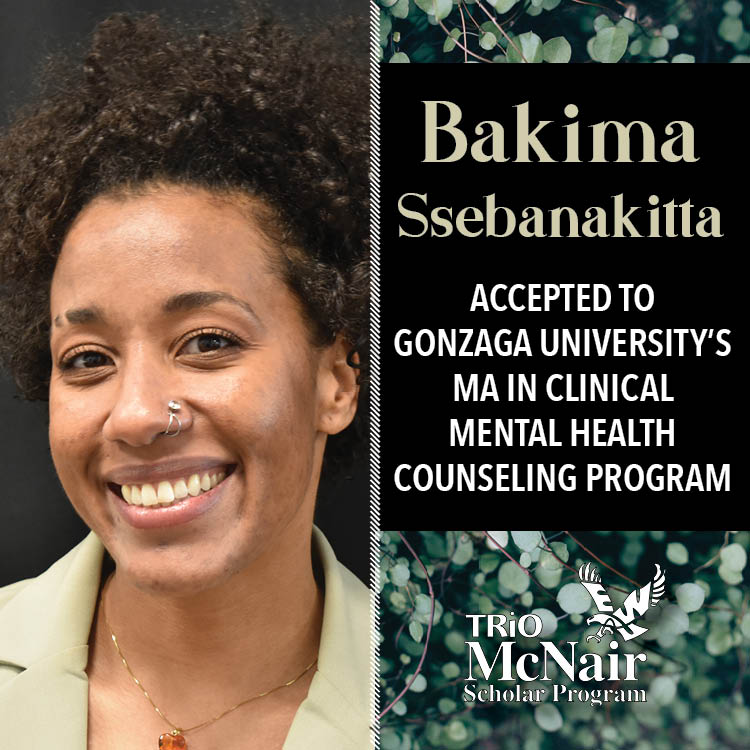
EWU McNair Scholar Bakima Ssebanakitta Accepted to Gonzaga’s MA in Clinical Mental Health Counseling Program
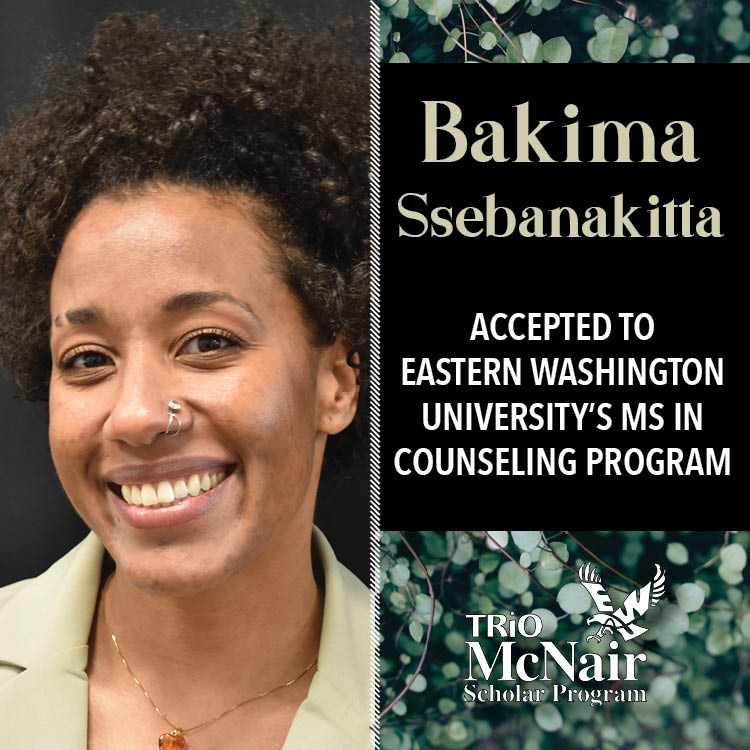
EWU McNair Scholar Bakima Ssebanakitta Accepted to Eastern Washington University MS in Counseling Program
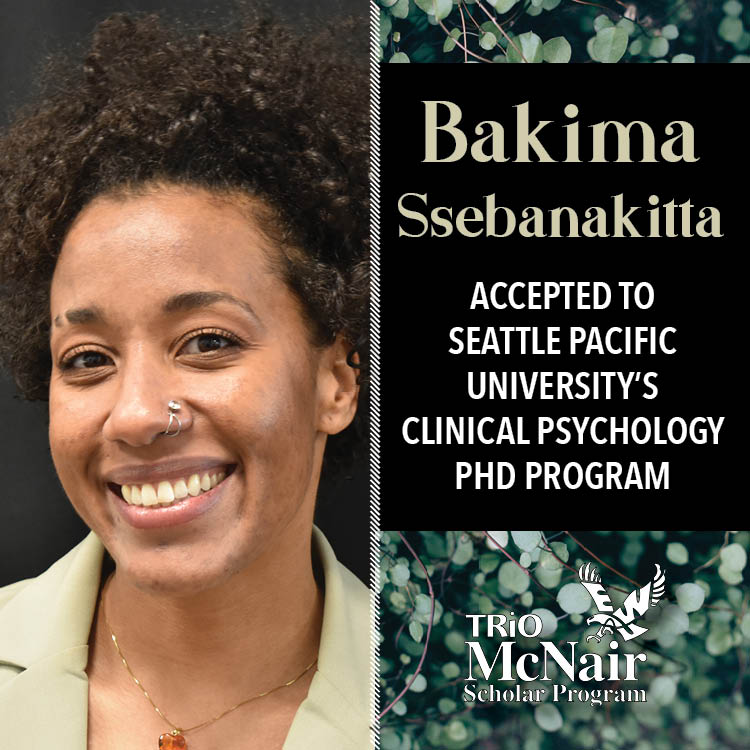
EWU McNair Scholar Bakima Ssebanakitta Accepted to Seattle Pacific University PhD Program



